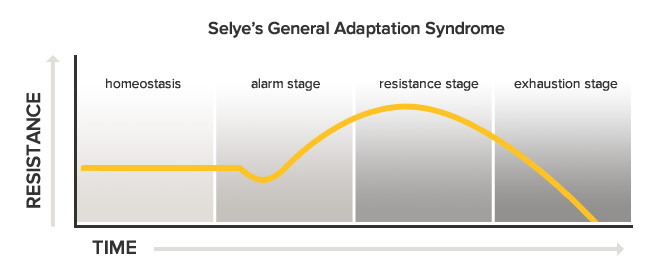“Every stress leaves an indelible scar, and the organism pays for its survival after a stressful situation by becoming a little older.” – Hans Selye, MD, PhD
Hans Selye, MD, PhD (1907 – 1982), the “Father of Stress”, was a Hungarian endocrinologist and the first to give a scientific explanation for biological “stress”. He actually borrowed the term “stress” from physics to describe an organism’s physiological response to perceived stressful events in the environment.
He eloquently explained his stress model, based on physiology and psychobiology, as the General Adaptation Syndrome (GAS), stating that an event that threatens an organism’s well being, a stressor, leads to a three-stage bodily response:
Stages of GAS
1: Alarm
Upon perceiving a stressor, the body reacts with a “fight-or-flight” response and the sympathetic nervous system is stimulated as the body’s resources are mobilized to meet the threat or danger.
2: Resistance
The body resists and compensates as the parasympathetic nervous system attempts to return many physiological functions to normal levels while body focuses resources against the stressor and remains on alert.
3: Exhaustion
If the stressor or stressors continue beyond the body’s capacity, the resources become exhausted and the body is susceptible to disease and death.

Evolving the Definition of Stress
As I nearly enter my 12th year of Naturopathic practice I am convinced that the traditional of definition of stress, simply geared towards a physical event or a mental state requiring the body to respond needs to evolve. We live in a society where there are stressful influences coming at us from all different directions. These stressors are multiple and confounded. Making the issue worse, is the way I see patients choosing to respond to their perception of stress. The increase use of alcohol, drugs, cigarettes, sugar and energy drinks in response to dealing with everyday stressors is creating an even more stressful situation in the body. Whether the stress, perceived as good or bad, or it is passive or active, the response by our bodies is intended to preserve life; it is a survival mechanism.
The Human Stress Response
The human stress response involves many components, as Selye’s work portrayed. First, the brain initiates the most immediate response signaling the adrenal glands to release epinephrine and norepinephrine. Then, the hypothalamus and pituitary activate another part of the adrenals, releasing cortisol. This is followed by the nervous system initiating behavioral responses like alertness, focus, reduction of pain receptors and the inhibition of reproductive behaviors and desires. The sympathetic nervous system then kicks in to increase the heart rate, blood pressure and release fuel to help fight or get out of danger as it redirects blood flow to the heart, muscles and brain, away from the gastrointestinal tract and digestive processes. To accommodate these demands there is a vast increase in energy production and utilization of nutrients and fluids in the body. Once the stressful situation has passed, the brain signals the responses to be “turned off” and finally recovery and relaxation allow the body to re-establish balance in all systems, replacing lost nutrients and eliminating waste products accumulated during the process.
The Missing Response Stage
The key element in this stress response that is missing in our modern day stress paradigm is RECOVERY. While there are usually recovery times for life threatening events like getting chased by a polar bear, there are few for the recurring events like relationship issues, financial pressures, job stresses, negative self-talk and image, poor physical conditioning, artificial lighting, a malnourished (processed) diet, inadequate sleep, genetically modified foods, environmental toxin accumulation and so on.
In fact, these types of stressors each day can string themselves together rendering the stress response to be “turned on” all of the time. In 2007, the American Psychological Association (APA) commissioned its annual nationwide survey to examine the state of stress across the country. The key findings were noted as “Portrait of a National Pressure Cooker” with almost 80% of the people surveyed reporting experiences of physical symptoms due to stress. I believe that modern day stress is the up stream culprit of many of the down stream chief complaints I see every day in my practice.
Perhaps “GAS” could also stand for Guidelines Against Stress and could us maintain healthy stress levels and responses by encouraging and educating us to identify and decrease unrelenting stressors. Also, we can help by re-pleating stress-induced nutrient depletions including vitamin C, B vitamins, calcium, and magnesium as well as supporting healthy detoxification pathways and adrenal function.Herbal adaptogen options such as rhodiola rosea and holy basil, ginsengs and withania further support the stress response. Relaxation practices such as meditation, breathing exercises and mindfulness, plus regular physical exercise are vital for our stress survival! Practice daily for maximum benefit.
Book in today to discuss how you can better support your stress response and counter its negative effects in overall health through lifestyle, nutrition, nutraceuticals and herbs, click on the following link and select ‘Book Appointment’ https://app.simpleclinic.net/public/diary/index/n7P
Leave a Reply